Political Economy
Most economists continue to celebrate China as one of the most successful developing countries in modern times. We, however, are highly critical of the Chinese growth experience. China’s growth has been driven by the intensified exploitation of the country’s farmers and workers, who have been systematically dispossessed through the break-up of the communes, the resultant collapse of health and education services, and massive state-enterprise layoffs, to name just the most important “reforms.” With resources increasingly being restructured in and by transnational corporations largely for the purpose of satisfying external market demands, China’s foreign-driven, export-led growth strategy has undermined the state’s capacity to plan and direct economic activity. Moreover, in a world of competitive struggle among countries for both foreign direct investment and export markets, China’s gains have been organically linked to development setbacks in other countries. Finally, China’s growth has become increasingly dependent not only on foreign capital but also on the unsustainable trade deficits of the United States. In short, the accumulation dynamics underlying China’s growth are generating serious national and international imbalances that are bound to require correction at considerable social cost for working people in China and the rest of the world. | more…
The U.S. economy in early March 2007 appears to be rapidly decelerating. Orders for durable goods in manufacturing dropped 8 percent in January and the manufacturing sector as a whole shrank during two of the last three months for which data is currently available (November–January), representing what is being called a “recession” in manufacturing, and raising the possibility of a more general economic downturn (New York Times, February 28, 2007) | more…
Changes in capitalism over the last three decades have been commonly characterized using a trio of terms: neoliberalism, globalization, and financialization. Although a lot has been written on the first two of these, much less attention has been given to the third. Yet, financialization is now increasingly seen as the dominant force in this triad. The financialization of capitalism-the shift in gravity of economic activity from production (and even from much of the growing service sector) to finance—is thus one of the key issues of our time. More than any other phenomenon it raises the question: has capitalism entered a new stage? | more…
Once upon a time the capitalist mode of production represented a great advance over all of the preceding ones, however problematical and indeed destructive this historical advance in the end turned out-and had to turn out-to be. By breaking the long prevailing but constraining direct link between human use and production, and replacing it with the commodity relation, capital opened up the dynamically unfolding possibilities of apparently irresistible expansion to which — from the standpoint of the capital system and of its willing personifications — there could be no conceivable limits. For the paradoxical and ultimately quite untenable inner determination of capital’s productive system is that its commodified products “are non-use-values for their owners and use-values for their non-owners. Consequently they must all change hands. . . . Hence commodities must be realised as values before they can be realised as use-values.” | more…
Twenty-first century capitalism is not an improved and benign version of its nineteenth- and twentieth-century manifestations, nor will it ever be, despite daily bluster by the system’s practitioners and apologists that a rising tide of prosperity will soon lift all boats. The animating principles of capitalism governing the pursuit of profits are as hollow and iniquitous now as they were in 1848, especially where human exploitation and the distribution of wealth are concerned. As super-capitalist Warren Buffett remarked recently in a trenchant understatement: “A market system has not worked well in terms of poor people” (The New York Times, June 27, 2006) | more…
Although some idealize and others demean the work of teachers, few people outside the field fully understand what it really means to teach. Misconceptions about teaching influence the ways that Americans think about the profession. One of the manifestations of this enduring disconnect between the American public and the professionals who teach is the low salaries teachers receive. This is the main issue that Moulthrop, Calegari, and Eggers tackle in this thorough and valuable ethnographic study of the lives of teachers, their daily struggle to make ends meet, and what it means to teach | more…

In his Essays in the Theory of Business Cycle published in Polish in 1933, Kalecki clearly stated the principle of effective demand in mathematical form. By 1935 he outlined his theory of employment, demolished the then-orthodox remedy for a depression — that is, wage cutting — and pinpointed the importance of investment for economic dynamics. | more…

This important essay dates from the end of the fifties. At that time, the rapid rate of Soviet industrialization had directed the attention of economists to problems of economic growth of former colonial areas which had won political independence. As Dobb points out, economists were chiefly concerned with the problems of growth under conditions of private ownership of capital and where investment is primarily under the control of private individuals or firms. The theories of economic growth in vogue at the time derived largely from the well-known growth conditions set forth by Roy F. Harrod and Evsey D. Domar. | more…
Our friends Leo Panitch and Colin Leys, editors of the Socialist Register, have recently published Coming to Terms with Nature: Socialist Register, 2007 (Monthly Review Press, 2006), which includes contributions by a distinguished group of analysts addressing crucial environmental issues—dealing with everything from “fossil capitalism” to eco-localism | more…
Rank-and-file rebellions began rumbling in the coalfields from Pittsburgh and down the Ohio River after 1964, when dissident miners first challenged incumbents in international and district United Mine Workers (UMW) elections. Concern and anger also seethed through the coalfields of southern West Virginia during those years, particularly over black lung, a painful and often-fatal occupational disease. Doctors Isadore E. Buff and Donald Rasmussen helped spark those rumblings with speeches in union halls, schools, and churches | more…
I have always lived in the long shadow of race. Johnstown, Pittsburgh, Portland, Miami Beach, in every city racist remarks and racist actions were commonplace. You didn’t have to look for them; they were hard to escape. And on our road trips, no matter where we went or for how few days, it was not at all unusual for a white person to offer a racist comment. It is almost as if there is an understanding among whites that they are all fellow conspirators in the race war | more…

This volume includes six essays, the first dating from 1935 and the last from 1967, by one of the outstanding economists of our time. The economics presented in this volume is political economy worthy of the name: a discipline that shows us the social relations, in particular the class and group conflicts, behind the economic quantitative relations. | more…


